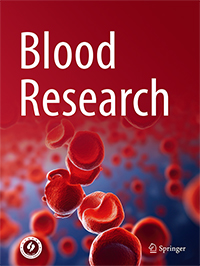Original Article
 Split Viewer
Split Viewer
Blood Res 2019; 54(2):
Published online June 30, 2019
https://doi.org/10.5045/br.2019.54.2.108
© The Korean Society of Hematology
Safety and efficacy of bendamustine in the conditioning regimen for autologous stem cell transplantation in patients with relapsed/refractory lymphoma
Correspondence to : Munira Shabbir-Moosajee, M.D.
Hematology/Oncology and Bone Marrow Transplantation, Aga Khan University Hospital, Karachi 74800, Pakistan
E-mail: munira.moosajee@aku.edu
This is an Open Access article distributed under the terms of the Creative Commons Attribution Non-Commercial License (http://creativecommons.org/licenses/by-nc/4.0) which permits unrestricted non-commercial use, distribution, and reproduction in any medium, provided the original work is properly cited.
Background
Bendamustine is an attractive option for the management of both de novo and relapsed lymphomas. It is being increasingly used in the conditioning regimen for autologous stem cell transplantation (SCT) and can be an alternative to the traditionally-used carmustine. In this study, we aimed to determine the safety and efficacy of bendamustine in the conditioning regimen for autologous SCT in refractory/relapsed lymphomas.
Methods
We designed a descriptive study to evaluate bendamustine in combination with etoposide, cytarabine, and melphalan (BeEAM) in the conditioning regimen for autologous SCT.
Results
Fourteen patients (median age, 28 yr) with Hodgkin's lymphoma (HL) (N=8), non-Hodgkin's lymphomas (NHL) (N=5), or peripheral T-cell lymphoma, not otherwise specified (PTCL NOS) (N=1) were included in the study. A median number of 5.95×106 CD34+ cells/kg were transfused. Median times to absolute neutrophil count and platelet engraftment were 17 days and 24 days, respectively. The 100-day transplantation mortality rate was 28% (4 patients). Eight patients (57.14%) had GII-III acute kidney injury, four patients (28.5%) had GIII-IV hyperbilirubinemia, and twelve patients (85%) had GII-III diarrhea. After 3 months, 37% (5 patients) and 21.4% (3 patients) demonstrated complete response and partial response, respectively. The median follow-up was 5.5 months (15 days–19 mo). At the final follow-up, 7 patients (50%) were alive and in CR.
Conclusion
Our study showed that bendamustine is a potentially toxic agent in the conditioning regimen for autologous SCT, resulting in significant liver, kidney, and gastrointestinal toxicity. Further studies are required to assess its safety and efficacy at reduced doses.
Keywords Bendamustine, Toxicity, Autologous stem cell transplant, Lymphoma
Article
Original Article
Blood Res 2019; 54(2): 108-113
Published online June 30, 2019 https://doi.org/10.5045/br.2019.54.2.108
Copyright © The Korean Society of Hematology.
Safety and efficacy of bendamustine in the conditioning regimen for autologous stem cell transplantation in patients with relapsed/refractory lymphoma
Munira Shabbir-Moosajee1, Samad Jehangir2, Sobiya Sawani3, Tariq Muhammed2, Natasha Ali4, Usman Sheikh4, Salman Adil4
1Hematology/Oncology and Bone Marrow Transplantation, 2Department of Oncology, Aga Khan University Hospital, 3Department of Community Health Sciences, 4Hematology and Laboratory Medicine, Aga Khan University Hospital, Karachi, Pakistan
Correspondence to:Munira Shabbir-Moosajee, M.D.
Hematology/Oncology and Bone Marrow Transplantation, Aga Khan University Hospital, Karachi 74800, Pakistan
E-mail: munira.moosajee@aku.edu
This is an Open Access article distributed under the terms of the Creative Commons Attribution Non-Commercial License (http://creativecommons.org/licenses/by-nc/4.0) which permits unrestricted non-commercial use, distribution, and reproduction in any medium, provided the original work is properly cited.
Abstract
Background
Bendamustine is an attractive option for the management of both de novo and relapsed lymphomas. It is being increasingly used in the conditioning regimen for autologous stem cell transplantation (SCT) and can be an alternative to the traditionally-used carmustine. In this study, we aimed to determine the safety and efficacy of bendamustine in the conditioning regimen for autologous SCT in refractory/relapsed lymphomas.
Methods
We designed a descriptive study to evaluate bendamustine in combination with etoposide, cytarabine, and melphalan (BeEAM) in the conditioning regimen for autologous SCT.
Results
Fourteen patients (median age, 28 yr) with Hodgkin's lymphoma (HL) (N=8), non-Hodgkin's lymphomas (NHL) (N=5), or peripheral T-cell lymphoma, not otherwise specified (PTCL NOS) (N=1) were included in the study. A median number of 5.95×106 CD34+ cells/kg were transfused. Median times to absolute neutrophil count and platelet engraftment were 17 days and 24 days, respectively. The 100-day transplantation mortality rate was 28% (4 patients). Eight patients (57.14%) had GII-III acute kidney injury, four patients (28.5%) had GIII-IV hyperbilirubinemia, and twelve patients (85%) had GII-III diarrhea. After 3 months, 37% (5 patients) and 21.4% (3 patients) demonstrated complete response and partial response, respectively. The median follow-up was 5.5 months (15 days–19 mo). At the final follow-up, 7 patients (50%) were alive and in CR.
Conclusion
Our study showed that bendamustine is a potentially toxic agent in the conditioning regimen for autologous SCT, resulting in significant liver, kidney, and gastrointestinal toxicity. Further studies are required to assess its safety and efficacy at reduced doses.
Keywords: Bendamustine, Toxicity, Autologous stem cell transplant, Lymphoma
Fig 1.

Overall survival.
Fig 2.

Disease free survival.
-
Patient characteristics. Abbreviations: CR, complete response; IPI, indicates international prognostic index; PD, progressive disease; PR, partial response; PTCL NOS, peripheral T-cell lymphoma, not otherwise specified..
-
Nonhematological toxicity.

Article Tools
Stats or Metrics
Related articles in BR
-
Bendamustine in heavily pre-treated multiple myeloma patients: Results of a retrospective analysis from the Korean Multiple Myeloma Working Party
Seok Jin Kim, Soo-Mee Bang, Yoon Seok Choi, Deog-Yeon Jo, Jin Seok Kim, Hyewon Lee, Hyeon Seok Eom, Dok Hyun Yoon, Cheolwon Suh, Je-Jung Lee, Junshik Hong, Jae Hoon Lee, Youngil Koh, Kihyun Kim, Sung-Soo Yoon, Chang-Ki Min, and Korean Multiple Myeloma Working Party
Blood Res 2016; 51(3): 193-199 -
Peripheral T-cell lymphoma, NOS in bone marrow and heart
Hye Won Lee and Ja Young Lee
Blood Res 2024; 59(): -
Genomic technologies for detecting structural variations in hematologic malignancies
Mi‑Ae Jang
Blood Res 2024; 59():




 PDF
PDF Standard view
Standard view Export citation
Export citation Share
Share  Download
Download Previous Article
Previous Article



